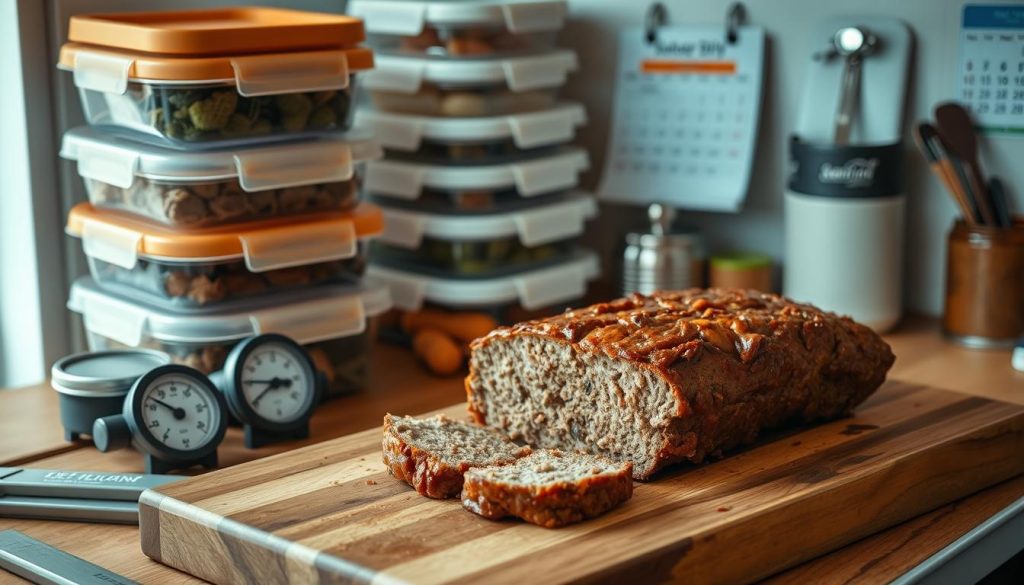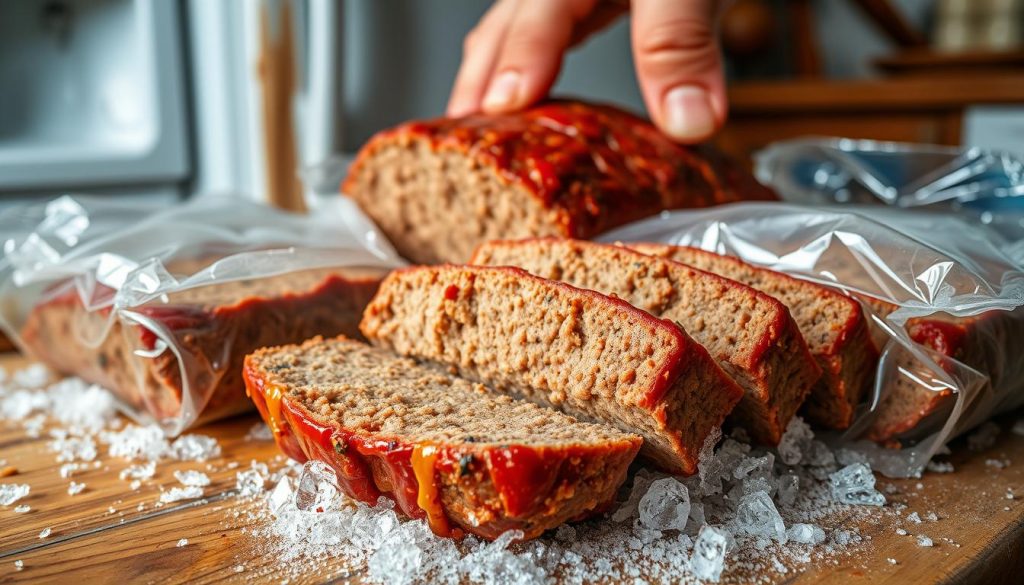Meatloaf is a beloved comfort food, but proper storage is key. This guide explores meatloaf storage and refrigerator best practices. Our goal is to help you enjoy safe meals without foodborne illness risks.
We’ll cover meatloaf’s fridge lifespan and crucial food safety tips. You’ll discover proper cooling methods and packaging techniques. We’ll also highlight signs of spoilage to watch for.
Learn about common storage mistakes to avoid. These tips will help keep your meatloaf fresh and safe to eat.
Key Takeaways
- Proper meatloaf storage is essential for food safety
- Learn the ideal refrigerator storage duration for meatloaf
- Understand the signs of spoiled meatloaf
- Discover best practices for cooling and packaging leftovers
- Explore safe reheating methods for stored meatloaf
- Learn how to prevent cross-contamination in your kitchen
Understanding Meatloaf Storage Basics
Proper food storage is crucial for meatloaf safety and quality. Let’s explore why it matters and what affects its shelf life.
Importance of Proper Food Storage
Correct meatloaf storage prevents illness and keeps it fresh. Good techniques help maintain quality and extend its edible period.
Factors Affecting Meatloaf Shelf Life
Several things impact how long meatloaf stays good in the fridge:
- Ingredients used
- Cooking method
- Cooling process
- Storage container
- Refrigerator temperature
Knowing these factors helps us make smart decisions about meatloaf storage. We can better judge when it’s safe to eat.
Safe Storage Temperature Guidelines
The right fridge temperature is key for meatloaf safety. Aim for 35°F to 38°F (1.7°C to 3.3°C). This slows bacterial growth and keeps meatloaf fresh longer.
| Storage Method | Temperature Range | Maximum Storage Time |
|---|---|---|
| Refrigerator | 35°F – 38°F | 3-4 days |
| Freezer | 0°F or below | 2-3 months |
Follow these guidelines to enjoy meatloaf safely. You’ll also reduce food waste and save money.
How Long Does Meatloaf Last in the Fridge
Cooked meatloaf can stay fresh in the fridge for 3 to 4 days. This timeframe follows standard food safety guidelines for leftover cooked meats. Proper storage is key to maintaining its quality.
To keep meatloaf fresh longer, use an airtight container or wrap it tightly. Store it in the coldest part of your fridge, usually the back of the bottom shelf. This area maintains the most consistent temperature.
Food expiration can vary based on fridge temperature and initial food quality. Always check for spoilage signs before eating leftover meatloaf. Trust your senses, regardless of storage time.
| Storage Method | Shelf Life |
|---|---|
| Refrigerator (40°F or below) | 3-4 days |
| Freezer (0°F or below) | 3-4 months |
For extended storage, freezing is a great option. Properly wrapped meatloaf can maintain quality in the freezer for up to 4 months. When ready to eat, thaw it in the fridge.
Consume thawed meatloaf within 24 hours for the best taste and texture. This ensures you enjoy your leftover meatloaf at its finest.
Signs of Spoiled Meatloaf
Spotting food spoilage is vital for meatloaf safety. Let’s explore key signs that show your meatloaf has gone bad. These indicators will help you maintain food quality and safety.
Visual Indicators of Spoilage
Look out for these visual clues:
- Mold growth (green, white, or fuzzy spots)
- Discoloration (grayish or brownish hues)
- Slimy surface texture
These signs clearly show your meatloaf is no longer safe to eat. Don’t risk your health by consuming spoiled food.
Smell and Texture Changes
Your senses can help detect spoilage:
- Sour or rancid odor
- Sticky or slimy texture when touched
- Unusual softness or mushiness
If you notice these changes, it’s best to discard the meatloaf. Trust your nose and fingers to guide you.
When to Discard Meatloaf
For food safety, throw away your meatloaf if:
- It’s been in the fridge for more than 3-4 days
- You spot any of the above signs of spoilage
- You’re unsure about its safety
Always prioritize your health over saving a questionable meal. If in doubt, toss it out. Your well-being is worth more than a spoiled dish.
Best Practices for Storing Cooked Meatloaf
Proper meatloaf storage ensures delicious leftovers. These expert tips will help you keep your meatloaf fresh and tasty. Learn how to preserve your meatloaf for days.

Cool your meatloaf quickly by slicing it into portions. Spread them on a tray to speed up cooling. This method also makes reheating easier later.
Transfer cool slices to airtight containers. Glass or plastic containers work best. Avoid metal containers as they can affect the taste.
Wrap individual slices in plastic wrap or foil before containerizing. This prevents freezer burn and keeps moisture in. Label containers with dates to track freshness.
- Store meatloaf in the coldest part of your fridge, usually the back
- Keep refrigerator temperature at or below 40°F (4°C)
- Use within 3-4 days for best quality
- Freeze for longer storage, up to 3 months
For freezing, double-wrap meatloaf in plastic wrap and foil. This method prevents freezer burn and preserves flavor. Thaw frozen meatloaf in the refrigerator overnight.
Reheat meatloaf thoroughly to 165°F (74°C) internal temperature. These storage tips will help you enjoy homemade meatloaf for days or months.
Proper Cooling and Packaging Methods
Fresh meatloaf starts with proper cooling and packaging. Learn the best practices to keep your dish delicious and safe. These methods will help you enjoy your meatloaf for days.
Cooling Timeline
Cool your meatloaf safely after cooking. Let it sit at room temperature for no more than two hours. Then, slice and place it in shallow containers for quicker cooling in the fridge.
Container Selection
Pick the right storage containers for your meatloaf. Airtight plastic or glass containers are ideal. They lock in moisture and block out odors. Ensure containers are clean and dry before use.
Wrapping Techniques
Proper wrapping keeps your meatloaf fresh. If you lack airtight containers, use plastic wrap or aluminum foil. Wrap tightly, and consider double-wrapping for extra protection.
| Method | Pros | Cons |
|---|---|---|
| Airtight Containers | Stackable, Reusable | Takes up more space |
| Plastic Wrap | Fits any shape, Cheap | Not eco-friendly |
| Aluminum Foil | Keeps moisture in, Recyclable | Can tear easily |
These cooling and packaging methods will keep your meatloaf fresh. Follow them to enjoy tasty leftovers for days to come.
Freezing Meatloaf for Extended Storage
Freezing meatloaf helps it last longer. Learn how to freeze meatloaf properly. This way, you can enjoy this comfort food for months.
Freezing Guidelines
To freeze meatloaf, wrap it tightly in plastic wrap and aluminum foil. This double-layer keeps freezer burn away. For single servings, slice the meatloaf before freezing.
Put slices on a baking sheet and freeze until solid. Then, move them to freezer bags for storage.

Proper Thawing Methods
Safe thawing is key to keeping food quality. The best way is to thaw meatloaf in the fridge overnight.
For faster results, use your microwave’s defrost setting. Just remember to cook it right after thawing.
Freezer Storage Duration
Frozen meatloaf can last up to 3-4 months when stored right. Label packages with dates to keep track.
It’s safe to eat after this time, but quality may drop. For the best taste, eat within the suggested timeframe.
| Storage Method | Duration | Quality |
|---|---|---|
| Refrigerator | 3-4 days | Best |
| Freezer | 3-4 months | Good |
| Freezer (beyond 4 months) | 6-12 months | Acceptable |
Follow these tips for freezing meatloaf. You’ll always have a tasty meal ready when you need it.
Reheating Stored Meatloaf Safely
Reheating meatloaf can be tricky, but it’s possible to enjoy a tasty and safe meal. Food safety is vital when handling leftovers. Let’s look at the best ways to reheat meatloaf.
For the best results, use an oven. Preheat it to 350°F and put your meatloaf in an oven-safe dish. Cover it with foil to keep moisture in and heat for 20-25 minutes.
Always check that the inside reaches 165°F with a meat thermometer. This ensures your meatloaf is safe to eat.
If you’re in a hurry, a microwave can work. Cut the meatloaf into slices and place them on a microwave-safe plate. Cover with a damp paper towel and heat in 30-second bursts.
For a crispy outside, try pan-frying. Slice the meatloaf and cook in a skillet over medium heat. Cook until both sides are golden brown and the center is hot.
| Reheating Method | Time | Temperature |
|---|---|---|
| Oven | 20-25 minutes | 350°F |
| Microwave | 2-3 minutes | High |
| Pan-frying | 3-4 minutes per side | Medium heat |
Proper storage is key to keeping your meatloaf fresh. Always store it in the fridge and eat within 3-4 days. This ensures the best taste and safety.
Food Safety Tips for Handling Meatloaf
Proper food handling is key when making meatloaf. Let’s look at some vital practices to keep your meatloaf safe to eat.
Kitchen Hygiene Practices
Clean kitchens prevent foodborne illnesses. Wash hands before and after handling raw meat. Clean all surfaces and tools with hot, soapy water to kill bacteria.
Temperature Control
Cook meatloaf to 160°F (71°C) inside to kill harmful bacteria. Use a meat thermometer in the thickest part. After cooking, refrigerate quickly to stop bacteria growth.
Cross-contamination Prevention
Use different boards for raw meat and other foods. Store raw meatloaf on the bottom fridge shelf. This stops juices from dripping onto other foods.
These steps can lower the risk of foodborne illnesses. They’re simple but effective in keeping your food safe.
- Wash hands frequently
- Clean surfaces and utensils
- Cook to proper temperature
- Refrigerate promptly
- Use separate cutting boards
Good kitchen habits make safe, tasty meatloaf. Remember, clean cooking leads to healthy eating.
Common Storage Mistakes to Avoid
Meatloaf storage errors can happen without us noticing. Let’s look at some common mistakes and learn how to keep our meatloaf safe and tasty.
Leaving meatloaf out is a big mistake. Bacteria grow fast between 40°F and 140°F. Refrigerate your meatloaf within two hours of cooking. Don’t wait for it to cool fully on the counter.
Using the wrong containers is another error. Choose shallow, airtight containers for your meatloaf. This helps it cool quickly and prevents air exposure, which can cause spoilage.
- Avoid overstuffing your fridge
- Don’t store meatloaf near raw meats
- Never reheat meatloaf multiple times
Poor wrapping can ruin meatloaf. Loose wrapping can dry it out or let it absorb other food smells. Use plastic wrap or foil to seal it tight before putting it in a container.
“Proper storage is key to maintaining the quality and safety of your meatloaf. Always follow food safety guidelines to protect your health.”
By avoiding these mistakes, we can enjoy our meatloaf safely for days. When in doubt, it’s better to throw out any questionable leftovers.
Health Risks of Consuming Spoiled Meatloaf
Eating spoiled meatloaf can be dangerous. It’s vital to know the risks of bad food. Let’s look at the effects and when to get help.
Foodborne Illness Symptoms
Spoiled meatloaf can cause food poisoning. You might feel sick, throw up, or have diarrhea. Stomach pain, fever, and headaches are also common.
These signs often show up quickly after eating bad food. Spotting these symptoms early helps prevent bigger problems.
When to Seek Medical Attention
Get medical help if you have severe symptoms after eating meatloaf. Look out for high fever, bloody stools, or signs of dehydration.
See a doctor if vomiting or diarrhea lasts more than three days. It’s always better to be safe with food poisoning.
Proper storage and handling of meatloaf can prevent health risks. Follow food safety rules to enjoy meals without worry.




